

By Ricardo Wyngaard, Mapula Thebe and Kgomotso Ramotsho
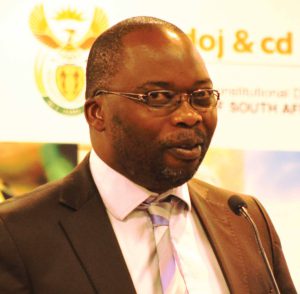
Minister of Justice and Correctional Services, Michael Masutha, was a guest speaker at the Women in Law Dialogue held in August.
Female lawyers gathered for the Women in Law Dialogue in Johannesburg on 26 and 27 August for a rare opportunity to celebrate achievements and to strategise on overcoming barriers for female lawyers. The Department of Justice and Constitutional Development (DOJ&CD) hosted the Dialogue to bring women in law together from across the spectrum, as well as aspiring women lawyers to assess progress in line with the Constitution and to propose interventions that will lead to gender equality.
Delegates and presenters came from various sectors of society, including: Academia, Chapter Nine institutions, provincial law societies, the legal profession, media houses, non-profit organisations, private practice and state departments. A number of dignitaries were present, including: The Minister of Justice and Correctional Services, advocate Michael Masutha; Deputy Minister of Justice and Constitutional Development, John Jeffery; representatives from the Black Lawyers Association (BLA); the Commission for Gender Equality; Foundation for Human Rights; the General Council of the Bar; National Association of Democratic Lawyers (NADEL); the Law Society of South Africa (LSSA); and Southern African Development Community Lawyers’ Association (SADC LA).
Director of the DOJ&CD’s Gender Directorate, Ntibidi Rampete, captured the key objectives of the dialogue as taking stock of progress made, the challenges experienced in mainstreaming women’s involvement in the legal profession and seeking out meaningful processes that will offer due recognition of the role played by women in the South African society.
BLA member and LSSA Councillor, Denise Lenyai, commented that strides, even though few in number, have been made for women in the legal profession. This has ultimately been for the betterment of the entire country. She remarked that it is important for women to encourage one another to do better adding that the legal profession has introduced pro bono initiatives to assist indigent members of society and women lawyers have made a significant contribution in this regard. She reflected that transformation is not only about changing laws, but also about changing minds.
Guest speaker, Mr Masutha, commented that the dialogue also marked the 60th anniversary of the women’s march that took place on 9 August 1956 when more than 20 000 women marched to the Union Buildings in protest of the extension of the Pass Laws to women. The march happened one year after the adoption of the Freedom Charter. It demonstrated the innate awareness of women to strike at the heart of a system that used an identity instrument to profile human beings. The dialogue, according to the Minister, provided an opportunity for delegates to reflect on the challenging lives of many women. With the focus being on the legal profession.
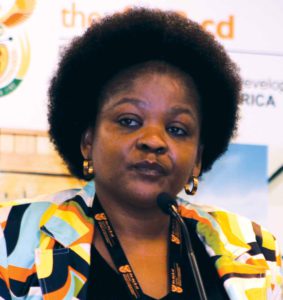
BLA member and LSSA Councillor Denise Lenyai at the Women in Law Dialogue. Ms Lenyai said it was important for women to encourage one another.
The Minister indicated that, since he took office, he had met with various professional bodies to understand transformation in the legal profession – or the lack thereof. Unfortunately, he found the statistics disheartening. South Africa’s constitutional imperatives are undermined by the under-representation of women, referred to him as ‘endangered species’. He remarked that ‘no economy can function without high-end skills’. A high number of women must be involved in order to secure a functional commercial system. It is important to change mind-sets. The department has, in light of this, embarked on the establishment of a comprehensive framework in its state litigation framework to promote gender transformation within the legal profession,’ he said
Mr Masutha also expressed the view that it is important to refocus the entire value chain of the criminal justice system. The victim has to be brought back to the centre of the criminal justice system through restorative justice. The department will, for example, not consider any application for parole unless there is evidence that some efforts have been made to involve the victim in the process.
The afternoon session of the first day started with general discussions facilitated by Dr Linda Meyer from the DOJ&CD. This session was filled with poignant reflections by women of the challenges experienced and their triumphs. Some of the key issues emanating from this discussion were:
Executive Secretary and Chief Executive Officer of the SADC LA, Makanatsa Makonese, facilitated the closing session of day one on Integrated Comparisons of the Legal Profession. This session explored regional experiences from Nigeria, Tanzania and Zimbabwe pertaining to litigation on women’s rights in Africa.
Researcher at the South African Institute of International Affairs at the University of Witwatersrand, Johannesburg, Winnie Mutungi, presented on the challenges faced by women in Tanzania, including: Child marriages, the killing of elderly women on suspicion of witchcraft and female genital mutilation. Currently Tanzanian laws are inadequate to deal with the challenges faced by women. However, the proposed Constitution has a number of provisions that will come to the aide of women in Tanzania. For example, s 22(2)(d) of the proposed Constitution provides that: ‘All land will be owned, used and managed as prescribed by a law enacted by Parliament to consider … every woman shall have the right to acquire, own, use, develop and manage land on the same conditions as for a man.’
Solicitor of the Supreme Court of Nigeria, Yewande Abiodun, observed the ongoing challenges faced by women in Nigeria, which are similar to those in Tanzania. Even though the law is inadequate to deal with those challenges, she highlighted the contributions made by various human rights organisations toward mainstreaming women’s rights in Nigeria. The Nigerian government has established the Federal Women Ministry of Affairs and Social Development and established women’s development centres in all 36 states and, in 2007, adopted a gender policy.
Zimbabwe Women Lawyers Association’s (ZWLA), Mildred Mubaiwa, reflected on the role of litigation in the promotion of women’s rights in Zimbabwe. ZWLA consists of over one hundred litigating lawyers advancing justice for women. The 2013 Zimbabwean Constitution has embraced women’s rights. For example, s 80(1) of the Constitution provides that: ‘Every women has full and equal dignity of the person with men and this includes equal opportunities in political, economic and social activities.’ Section 80(3) provides that, ‘All laws, customs, traditions and cultural practices that infringe the rights of women conferred by this Constitution are void to the extent of the infringement.’ She elaborated on three recent public interest matters affecting the rights of women. She concluded that the interventions of various human rights organisations have contributed significantly towards gender transformation in Zimbabwe.
Ricardo Wyngaard, Senior Legal Officer, Professional Affairs, Law Society of South Africa ricardo@lssa.org.za
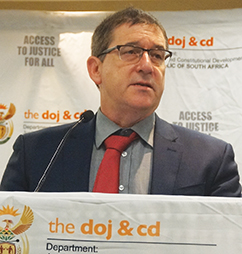
Deputy Minister of Justice and Constitutional Development, John Jeffery, speaking at the Women in Law Dialogue held in August.
On the second day of the conference, Deputy Minister of the DOJ&CD, John Jeffery, delivered the keynote address. He began his address by recounting the history of female lawyers in the profession.
Mr Jeffery said that in President Nelson Mandela’s cabinet there were two female ministers – Minister Nkosazana Dlamini-Zuma and Minister Stella Sigcau. He added: ‘In 1999, President Mbeki appointed 4 women to his cabinet and what was interesting was the response from certain quarters on their appointments. For example, the LA Times questioned the appointment of Minister Dlamini-Zuma as foreign minister, saying that she had a “fiery, divisive style.” But at the heart of it lies this – would any of the critics have complained about a so-called “fiery style” if she was male? For example, in the article mentioned none of the male appointments’ personalities were discussed. Or, if she were male, would they have referred to her fiery style in more complimentary terms, using terms such as charismatic, or spirited or determined or resolute instead?’
Mr Jeffery said that women are often referred to as ‘princesses’ or ‘prima donnas’. ‘The term prima donna is usually used as an insult, while the male version of the term is never used. Also, the term prince is usually used in a positive connotation,’ he added.
Mr Jeffery said the majority of law graduates are women, however, as one goes higher up the scale of women in the profession becomes less, adding that there is a greater problem in the Bar as there are currently nine female silks. ‘The stakeholders of the profession have become complacent and are taking no action on this matter. We also see the same problem in the Constitutional Court, women are under-represented. The four candidates shortlisted for the vacant position at the court are all men. The state is doing what it can to transform the legal profession. Government has met its target of giving value briefs to previously disadvantaged individuals,’ he said.
‘We have lots of dialogues, but do we get results? How far has women representation in the law and politics come, what can we do to speed things up? We would have to go sector by sector to check the progress to assess what are the issues and barriers to the advancement of women. These dialogues usually bring about radical resolutions with no programme of action. We will come back here next year and discuss the same things again. Let us be goal orientated,’ Mr Jeffery said.
Gender transformation in the legal profession commission
During the ‘Gender transformation in the legal profession commission’ presentation, council member of the LSSA, Mimie Memka, asked why is transformation taking such a long time in South Africa? She added that the Constitution gives the rights for transformation and that it was up to South Africans to implement the process and ensure equality in the workplace. ‘In spite of all the available legislation, the bottleneck occurs in the implementation of the legislation. In order to fulfil this process, we need to have a mind shift,’ she said.
Ms Memka said that the slow pace of transformation in the legal profession can be attributed to the way female practitioners are perceived by their peers. ‘The perception is that the legal playground was never intended for women even though women practitioners have the same abilities to execute the same mandates as our male counterparts. Women must not be apologetic, it is our right to be in the profession,’ she said.
Linda Nyathi from the Commission for Gender Equality (CGE) explained that the CGE is a Chapter 9 institution tasked with the promotion and protection of gender rights and one day attaining gender equality. She added that the CGE works on gender related problems and monitors gender equality in order to make recommendations.
Ms Nyathi said that in 2012 CGE engaged professional bodies, including the Office of the Chief Justice. She added that during the engagement, CGE found that there were no concerted efforts to help women attain positions in the judiciary. ‘The CGE attended the Judicial Service Commission interviews to gauge the deliberations and to see who gets to be recommended. We saw that during the interviews, female candidates were asked how they will cope with the workload, whereas the male candidates were not asked that question,’ she said.
Advocate Thandi Norman SC, from Advocates for Transformation, said that becoming a judge is not as easy as it appears. She added: ‘No one teaches you to be a judge, you need to experience it, it only gets easier with experience. As women, we need to establish our own pool of candidates that can be appointed as judges. We then take it upon ourselves to interview these candidates before they even appear before the Judicial Service Commission.’
Mapula Thebe NDip Journ (DUT) BTech (Journ) (TUT) is the editor of De Rebus.
The challenges law students face
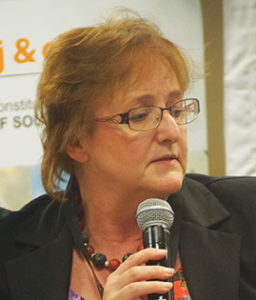
Department of Justice and Constitutional Development, Chief Financial Officer, Loraine Rossouw, speaking at the Women in Dialogue.
Female candidate attorneys said that they feel let down by the other women in the legal profession. They were having a discussion on the topic ‘Current state of affairs in law schools’. Candidate attorneys were given an opportunity to voice their concerns about the challenges they come across in the legal profession. The majority of them shared similar experiences that they are faced with in their law studies and the profession itself.
Candidate attorney at the University of Johannesburg and a member of the Black Lawyers Association Student Chapter, Rutendo Chapwanya, said it is disappointing that the women they look up to, are not availing themselves to mentor. Ms Chapwanya said some female students get discouraged to pursue their legal studies because of the treatment they receive from their seniors in the profession. She said that although men in the profession offer to mentor them, some of them expect a favour for a favour. ‘When you ask men in the legal profession to help out, some of them have intensions beyond just mentoring, some end up wanting to benefit from female students in an inappropriate way,’ she said.
Ms Chapwanya also said women in the legal profession are at a disadvantage, because they do not get treated the same way as their male counterparts. She agreed with her fellow law students in saying that they are not taken seriously as women in the profession, and that black women are labelled as incompetent and emotional.
Another issue that was raised was about the quality of law curriculum, candidate attorneys said the quality of the curriculum is poor, and added that some of the universities do not offer practical legal training. They said the training should be compulsory at university level.
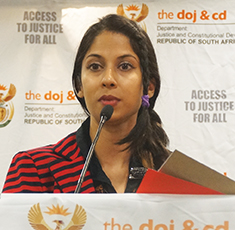
Attorney and founder of the Stand Up! Foundation, Shabnam Mohamed, giving feed-back from the ‘Current state of affairs in law schools’ discussion at the Women in Law Dialogue.
Attorney and founder of the Stand UP! Foundation, Shabnam Mohamed, said that the foundation has been discussing the issues of the poor quality of legal education for the past ten years. She added that government needs to legislate the issue of the law curriculum, for it to have impact. She said if they do not legislate it, there is no way legal students are going to have accountability and that another generation of law students will have the same discussions.
Attorney and Chairperson of the Personal Injury Committee of the LSSA, Lindy Langner, who was facilitating the ‘Current state of affairs in law schools’ discussion said the LSSA is in talks with some law firms, to help with the legal practical training issue. She also told candidate attorneys that the LSSA has a department called Legal Education and Development (LEAD), which is an educational training department for candidate attorneys, as well as where practising attorneys can enhance and promote themselves.
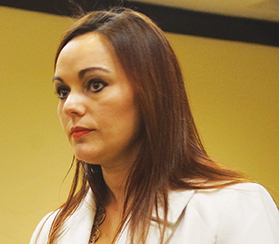
Attorney and Chairperson of the Personal Injury Committee of the Law Society of South Africa, Lindy Langer, was facilitating the ‘Current state of affairs in law schools’ discussion at the Women in Law Dialogue.
Ms Langner said that in the many programmes LEAD offers, they are promoting more female participation. She said statistics showed that there are more female law students than male and that it showed that female law students were engaging the profession, however, she added that as time goes on female candidate attorneys exit the profession once they start to practice.
Ms Langner said the commercial law arena does not cater for women’s needs, and added that government and the LSSA are trying to find ways to rectify this to ensure women remain in the profession.
NADEL representative, Ugeshnee Naicker, said government separated basic education from higher education, however, equality in the system cannot be looked at piecemeal because one system is conveyable to the next system. She said the current status of the law degree falls in the fragmented system that was created by Bantu education.
Ms Naicker asked what the purpose of the current law degree is? She also asked if universities have had dialogues to change the system? She further asked if universities looked at African jurisprudence and if they developed the African women jurisprudence? She referred to the ‘Rhodes must fall’ incident and said it all started because there is an ideological struggle for the decolonisation of education. Ms Naicker added if the law degree is not decolonised then law students are being failed. She noted that from an economic perspective, women come from severely affected economic conditions. She said females experience more poverty than males.
Ms Naicker said there are women coming from disadvantaged backgrounds and they are marginalised students. They were marginalised in a public education system that did not serve them. She said that when some of these women get to tertiary institutions, they face abuse from residency and struggle to pay fees and end up giving into the life of the ‘blesser’ syndrome. Ms Naicker said statistics showed that a number of law students dropped out because the public education system failed them at a junior level. In conclusion, Ms Naicker announced that NADEL is going to start student chapters at universities, she said the student chapters will be human rights based and that they want to create human rights lawyers and encourage them to do community projects.
Kgomotso Ramotsho Cert Journ (Boston) Cert Photography (Vega) is the news reporter at De Rebus.
This article was first published in De Rebus in 2016 (Nov) DR 20.